-

Aggressive Tax Avoidance Scheme: The Emergence of the Continuous Distortion of the Fine Line Between Tax Avoidance and Tax Evasion
0₦2,500.00Isaiah Akano in his article, Aggressive Tax Avoidance Scheme: The Emergence of the Continuous Distortion of the Fine Line Between Tax Avoidance and Tax Evasion, explores the thin line between Tax Avoidance and Tax Evasion. Tax is one of the major sources of revenue of the government in Nigeria. As a matter of fact, at the inception of the year 2024, the Federal Government tasked the Federal Inland Revenue Service to generate a whopping sum of N19.4 trillion which amounts to about sixty percent increase from the sum of N12.3 trillion generated by it in 2023 in a bid to raise the overall government revenue as a percentage of the Gross Domestic Product (GDP) to 25% . The revenues are meant to be generated from individuals, companies and other legal entities through tax. Hence, there is a need for citizens and corporate bodies to arrange their affairs in such a way that they can attract a minimal tax, especially in view of the harsh economic condition in the country, high inflation rate, the weak value of the naira and high interest rate on loans which most businesses resorted to, as their major source of capital. Tax lawyers, Accountants and other tax consultants had at different times proffered different ‘tax avoidance schemes’ to their clients. Some of the Schemes are aggressive and complex in nature and there are instances wherein they were eventually interpreted by the Court to amounting to tax evasion. Akano seeks to take a critical look at the line of differences between tax avoidance and tax evasion and also discuss the continuous distortion of same as a result of the advent of aggressive tax avoidance schemes in recent years.
-

A “Deeper Dive”: The New Deduction of Tax at Source (Withholding) Regulations, 2024
0₦2,500.00Stephen Arubike and Adeyinka Adeoye in their article, A “Deeper Dive”: The New Deduction of Tax at Source (Withholding) Regulations, 2024, provide a comprehensive analysis of the Deduction of Tax at Source (Withholding) Regulations, 2024 (the “Regulations”), issued by Nigeria’s Minister of Finance and the Coordinating Minister of the Economy. Effective from January 1, 2025, the Regulations replace previous regulations on the subject, introduce several significant changes to the country’s withholding tax (WHT) regime. Key provisions include adjustments to applicable tax rates, expanded coverage of taxable entities, and a new emphasis on taxpayer identification numbers (TINs) to drive compliance. Arubike and Adeoye also address critical legal concerns raised by the Regulations, including conflicts with primary statutes, overreach in the Minister’s authority, and the unfair imposition of penalties on non-resident companies. While the Regulations aim to simplify WHT processes, reduce tax burdens on small businesses, and enhance tax compliance, several ambiguities and issues remain, particularly regarding non-resident taxation and penalties for non-compliance. Arubike and Adeoye conclude by discussing the transition period and its potential implications, as well as the need for further clarification on certain provisions to ensure fairness and legal consistency in implementing the Regulations.
-

Value Added Tax on Real Estate Lease Transactions: Connecting the Dots
0₦2,500.00In their article, Value Added Tax on Real Estate Lease Transactions: Connecting the Dots, Stephen Arubike and Utonwa Onwumelu tackle the application of Value Added Tax (VAT) to real estate lease transactions. Whilst VAT payment in Nigeria is limited to supplies of either “goods” or “services”, the law only exempts from VAT “goods” or “services” that are explicitly listed in the statute. The failure to define the terms “goods” or “services” prior to 2019 led to the conclusion in some judicial decisions that lease transactions are subject to VAT because neither lease nor interest in land is explicitly exempt from VAT. Arubike and Onwumelu aim to explore the historical context of ‘the absence of precise definition’ controversy, the rationale behind judicial interpretations, the impact of the Finance Acts 2019, 2020 and 2023 in resolving these definition issues and their practical implications.
-
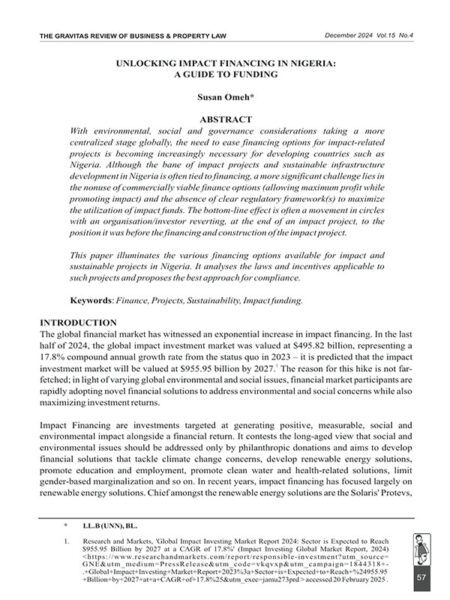
Unlocking Impact Financing in Nigeria: A Guide to Funding
0₦2,500.00Susan Omeh in her article, Unlocking Impact Financing in Nigeria: A Guide to Funding, sheds light on the various financing options available for impact and sustainable projects in Nigeria. In doing this, Omeh analyses the laws and incentives applicable to such projects while also proffering the best approach for compliance. With environmental, social and governance considerations taking a more centralized stage globally, the need to ease financing options for impact-related projects is becoming increasingly necessary for developing countries such as Nigeria. Although the bane of impact projects and sustainable infrastructure development in Nigeria is often tied to financing, a greater challenge lies in the nonuse of commercially viable finance options (allowing maximum profit while promoting impact) and the absence of clear regulatory framework(s) to maximize the utilization of impact funds. The bottom-line effect is often a movement in circles with an organization/investor reverting, at the end of an impact project, to the position it was before the financing and construction of the impact project.
-
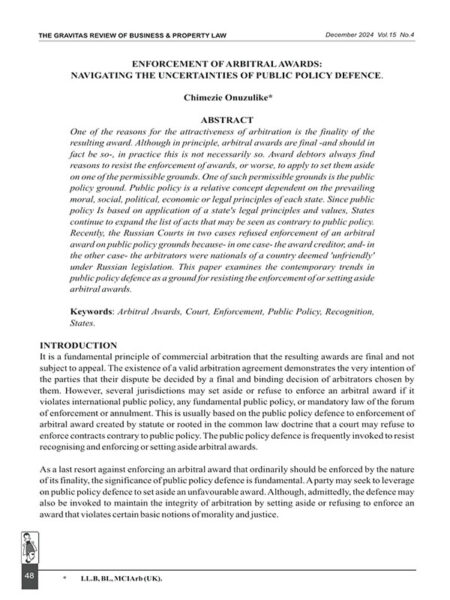
Enforcement of Arbitral Awards: Navigating the Uncertainties of Public Policy Defence
0₦2,500.00Chimezie Onuzulike in his article, Enforcement of Arbitral Awards: Navigating the Uncertainties of Public Policy Defence, examines the contemporary trends in public policy defence as a ground for resisting the enforcement of or setting aside arbitral awards. One of the reasons for the attractiveness of arbitration is the finality of the resulting award. Although in principle, arbitral awards are final -and should in fact be so-, in practice this is not necessarily so. Award debtors always find reasons to resist the enforcement of awards, or worse, to apply to set them aside on one of the permissible grounds. One of such permissible grounds is the public policy ground. Public policy is a relative concept dependent on the prevailing moral, social, political, economic or legal principles of each state. Since public policy Is based on application of a state’s legal principles and values, States continue to expand the list of acts that may be seen as contrary to public policy. Recently, the Russian Courts in two cases refused enforcement of an arbitral award on public policy grounds because- in one case- the award creditor, and- in the other case- the arbitrators were nationals of a country deemed ‘unfriendly’ under Russian legislation.
-
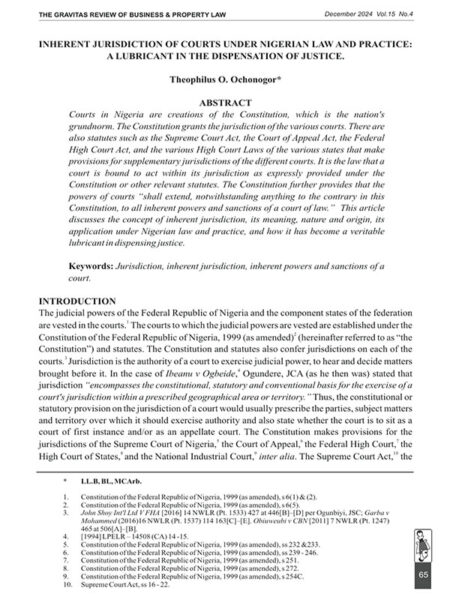
Inherent Jurisdiction of Courts under Nigerian Law and Practice: A Lubricant in the Dispensation of Justice
0₦2,500.00Theophilus Ochonogor in his article, Inherent Jurisdiction of Courts under Nigerian Law and Practice: A Lubricant in the Dispensation of Justice, discusses the concept of inherent jurisdiction, its meaning, nature and origin, its application under Nigerian law and practice, and how it has become a veritable lubricant in the dispensation of justice. Courts in Nigeria are creations of the Constitution, which is the nation’s grundnorm. The Constitution grants the jurisdictions of the various courts. There are also such statutes as the Supreme Court Act, the Court of Appeal Act, the Federal High Court Act and the various High Court Laws of the various states which make provisions for supplementary jurisdictions of the different courts. It is the law that a court is bound to act within its jurisdiction as expressly provided under the Constitution or other relevant statute. The Constitution further provides that the powers of courts “shall extend, notwithstanding anything to the contrary in this Constitution, to all inherent powers and sanctions of a court of law.”
-
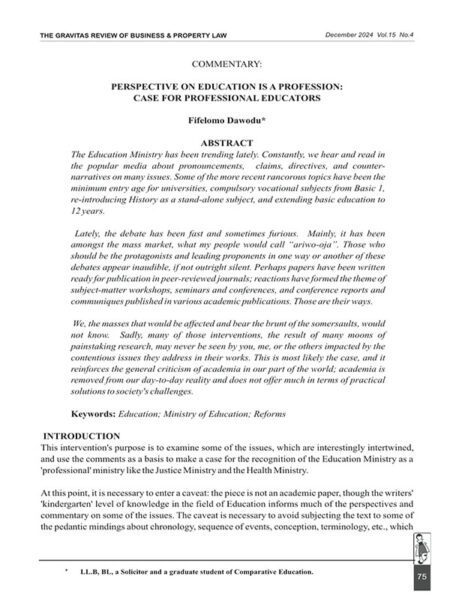
Perspective on Education as a Profession: Case for Professional Educators
0₦2,500.00Fifelomo Dawodu in her commentary, Perspective on Education as a Profession: Case for Professional Educators, takes a swipe at the various somersaults in the regulatory policies of the Ministry of Education highlighting the systemic impact on the entire educational sector. The Education Ministry has been trending lately. Constantly we hear and read in the popular media about pronouncements, claims, directives, counter-narratives on many issues. Some of the more recent rancorous topics have been minimum entry age for universities, compulsory vocational subjects from Basic 1, re-introduction of History as a stand alone subject, and extension of basic education to 12 years. The debate of late has been fast and sometimes, furious. Sadly, many of those interventions, the result of many moons of painstaking research may never be seen. This is most likely the case and it reinforces the general criticism of academia in our part of the world, that academia is removed from our day to day reality and does not offer much in terms of practical solutions to society’s challenges.
-
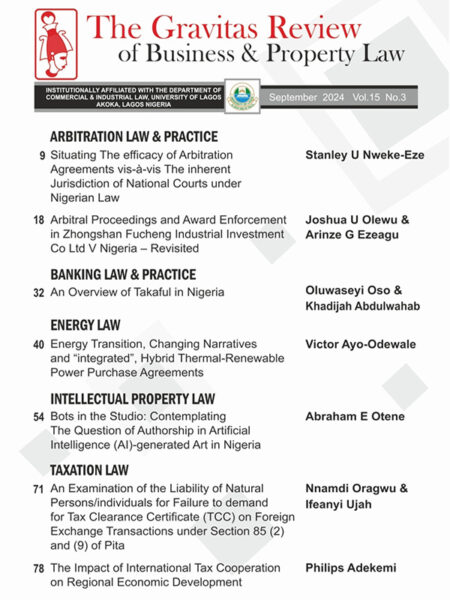
The Gravitas Review of Business & Property Law Vol.15 No.4 – Print
0₦5,000.00In this issue of The Gravitas Review of Business & Property Law Vol.15 No.4, there are well researched articles on:
- Taxation
- Arbitration Law & Practice
- International Investments
- Litigation Practice & Procedure
- Education – Commentary
-
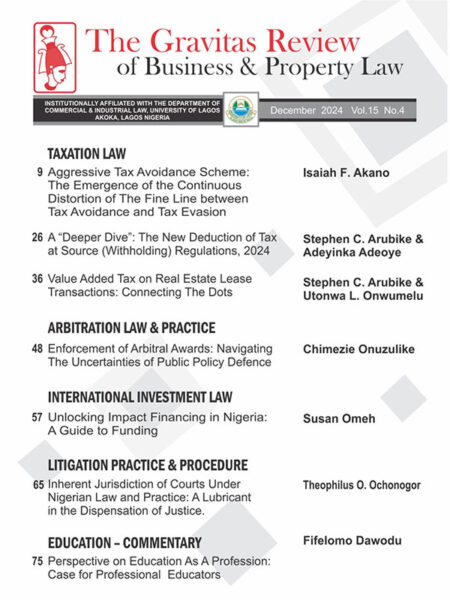
The Gravitas Review of Business & Property Law Vol.15 No.4 – E-Book
0₦5,000.00In this issue of The Gravitas Review of Business & Property Law Vol.15 No.4, there are well researched articles on:
- Taxation
- Arbitration Law & Practice
- International Investments
- Litigation Practice & Procedure
- Education – Commentary
-

The Gravitas Review of Business & Property Law Vol.15 No.4
0₦5,000.00In this issue of The Gravitas Review of Business & Property Law Vol.15 No.4, there are well researched articles on:
- Taxation
- Arbitration Law & Practice
- International Investments
- Litigation Practice & Procedure
- Education – Commentary
-

The Gravitas Review of Business & Property Law Vol.15 No.3 – Print
0₦5,000.00In this issue of The Gravitas Review of Business & Property Law Vol.15 No.3, there are well researched articles on:
- Arbitration Law & Practice
- Banking Law & Practice
- Energy Law
- Intellectual Property Law
- Taxation
-

The Gravitas Review of Business & Property Law Vol.15 No.3 – E-Book
0₦5,000.00In this issue of The Gravitas Review of Business & Property Law Vol.15 No.3, there are well researched articles on:
- Arbitration Law & Practice
- Banking Law & Practice
- Energy Law
- Intellectual Property Law
- Taxation
The Gravitas Review of Business & Property Law
